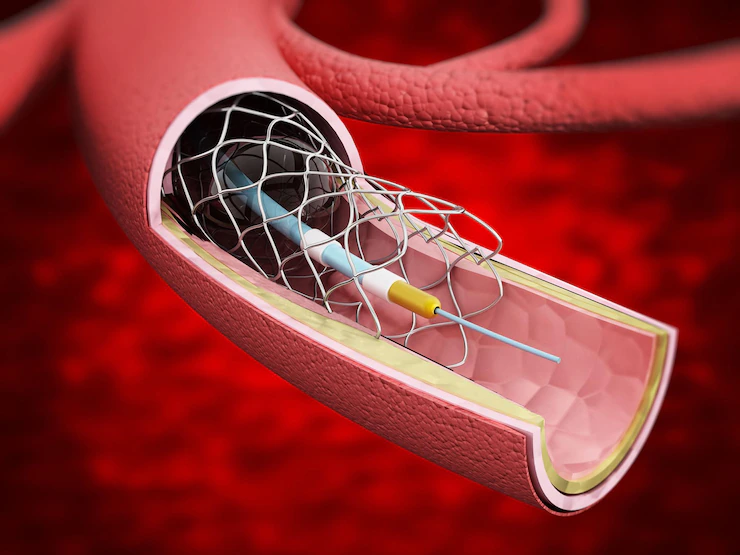
Percutaneous coronary angioplasty (PTCA or PCI) is a non-surgical procedure used to treat narrowing (stenosis or blockages) of the coronary arteries (arteries supplying blood to the heart). The procedure uses coronary catheterization to visualize the blood vessels on X-ray imaging. After this, an interventional cardiologist can perform a coronary angioplasty, using a balloon catheter in which a deflated balloon is advanced into the obstructed artery and inflated to relieve the narrowing; certain devices such as coronary stents or scaffolds can be deployed to keep the blood vessel open. Various other procedures on the heart and cardiovascular vessels can also be performed. Dr.Bhanukiranreddy Maddi is considered among top angioplasty doctors in Hyderabad.
Primary angioplasty (PPCI) is the urgent use angioplasty in people with acute myocardial infarction (heart attack), especially where there is evidence of severe heart damage on the electrocardiogram (ST elevation MI). PPCI is also used in people after other forms of myocardial infarction or unstable angina where there is a high risk of further events. Finally, PCI may be used in people with stable angina pectoris, particularly if the symptoms are difficult to control with medication. PCI is an alternative to coronary artery bypass grafting (CABG, bypass surgery), heart operation under general anesthesia, bypasses are done on the stenotic arteries by grafting vessels from elsewhere in the body under certain circumstances when extensive blockages, usually in diabetes. To analyze and to give you the best advice you need the best angioplasty doctor.
A stent is a tiny mesh tube inserted at the blockage site to help the artery stay open. Like a bridge support, it prevents the artery from collapsing. Along with providing immediate help by keeping the artery open, stenting has long-term benefits because it can eliminate many factors causing restenosis, including regulating the size of the arterial opening and decreasing the effects of arterial wall thickening. Nowadays you also get stents, which are coated, with drugs that prevent restenosis.
Bhanu Heart Care, the best cardiac coronary angioplasty clinics, hospitals and centers equipped with the best coronary angioplasty doctors, cardiac surgeons, specialists is reputed for the best cardiac coronary angioplasty tests, carornary angioplasty treatment, carornary angioplasty services in Nizampet, Miyapur, Chandanagar, Hyderabad.
Bhanu Heart Care is the Cardiac coronary angioplasty test center surgeon/ doctor services treatment. We have a highly experienced coronary angioplasty surgeon specialist who provides comprehensive coronary angioplasty hospital treatment in Miyapur, Chandanagar, Madinaguda and Hyderabad.
Unlike operation, angioplasty is done under local anesthesia. This makes the procedure painless. You will be mildly sedated but conscious. You can communicate with the doctors during the procedure. If you desire you can even see your angioplasty, live on the monitor screen!
The procedure is relatively safe when performed by experienced hands. However it does carry some risk of mortality, which varies from 1-2%. This is much smaller than the risk of the natural disease. During the procedure there is 3-4% chance of abrupt blockage of the same artery requiring an emergency surgery. The risk of complications is directly proportional to the severity of the underlying disease. The various study data of coronary angioplasty shows restenosis rate of approx. 5%-30% depending upon the type of angioplasty and stent used. Restenosis usually occurs during the first 6 months.
With the newer advances, the incidence of the recurring blockage (restenosis) is reducing rapidly. Without the stent i.e. with the plain old balloon angioplasty, the recurrence rate is around 25-30%. With the regular stents there is recurrence rate of about 12%-15%. With the newer DES (Drug Eluting Stents), the incidence is only 3-9%.
Ideally after the angioplasty, you must modify your life style, have aggressive control of risk factors, use of proper medications, light exercise, yoga and meditation. Normally with these methods, additional plaque and blockages should not form. However, restenosis can occur for a variety of reasons, some of which have to do with the nature's way to heal or the strength of the arterial walls.
The best advice is to follow your doctor's instructions and be meticulous about routine cardiac check-ups. This will insure that future blockages, if at all any, are detected and treated quickly. If you experience any chest pain or discomfort, contact your doctor and seek medical help immediately.
Copyright © 2022 Bhanuheartcare. All rights reserved. Build with 

WhatsApp us